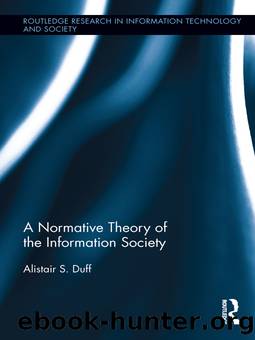A Normative Theory of the Information Society by Alistair S. Duff

Author:Alistair S. Duff [Duff, Alistair S.]
Language: eng
Format: epub
Tags: Social Science, Sociology, General, Media Studies, Computers, Information Technology
ISBN: 9781136489914
Google: mubGBQAAQBAJ
Publisher: Routledge
Published: 2012-03-12T05:42:32+00:00
It should be emphasised that the theorem is unwavering about the denotation of distributive justice: information itself, rather than digital media, or ICTs, or the telecommunications infrastructure, or the information superhighway. For the normative theory of the information society, the latter are significant only insofar as they impinge on the social distribution of information itselfâinformation qua facts, reliable data, the building-blocks of knowledge and participation. Thus the digital divide is politically important primarily because of the way that it reveals the underlying structural issue of the unfair social distribution of hard information, the class stratification that turns some people into informed citizens while making others informationally illiterate and apathetic. It is this human hinterland, the sociological and psychosocial terrain inland of the digital hubs, teleports and access points, that festers in the absence of whole-hearted political ministrations, and that demands genuinely innovative thinking. A new edition of geometric/horizontal/differential egalitarianism, the second principle of the Rawls-Tawney Theorem is designed to achieve the correct public policy balance in addressing the fundamental problem behind the digital divide, namely, unjustifiable inequalities in the social distribution of important information in post-industrial societies. Now more flesh will need to be put onto its bones.
The first clause, expressing a conception of equality of opportunity, mandates equal access to information. It does not insist that every citizen ends up with the same amount, but that people should haveâin practice as well as âon paperââan equal chance of having the same amount. In the field of education, where the principle has been very widely invoked, its import is now tolerably clear. Equality of opportunity means that all children should have roughly the same quality of primary and secondary schooling and thus the same prospects of entry into tertiary education. For social democrats, this in turn entails both the drastic improvement of many state schools and (although here some social democrats demur) the gradual integration of private schoolsânot least those which trade in the UK under the âcomically inappropriateâ label of âpublic schoolsâ (Tawney 1923: 22; cf. Tawney 1943)âinto a popular national educational system. But what would be the equivalent in information, as distinct from education? It is difficult to grasp the concept except by speaking in terms of institutions, for example a good public library system, a nationalised telecommunications network, or perhaps some wholly new type of information institution. I will pursue such details below; the point here is to establish that the second principle of information justice enshrines an ideal of equal opportunities in the substantive sense of equal access to information.
As we saw in the previous chapter, however, equality of opportunity is compatible with a very unequal society. While going further than relief of the information poor, equal access, judging by the prevalence of centreground political rhetoric paying homage to it, is not even controversial. Hence considerations of information justice spur real social democrats onwards and upwards, to a second clause, the difference principle. This states that inequalities of outcome are permissible as long as they maximise
Download
This site does not store any files on its server. We only index and link to content provided by other sites. Please contact the content providers to delete copyright contents if any and email us, we'll remove relevant links or contents immediately.
Collaborating with Parents for Early School Success : The Achieving-Behaving-Caring Program by Stephanie H. McConaughy; Pam Kay; Julie A. Welkowitz; Kim Hewitt; Martha D. Fitzgerald(897)
Entrepreneurship Education and Training: The Issue of Effectiveness by Colette Henry Frances Hill Claire Leitch(665)
Adding Value to Policy Analysis and Advice by Claudia Scott; Karen Baehler(499)
Materializing the Middle Passage by Jane Webster;(496)
Race and American Political Development by unknow(488)
Sociological Perspectives of Health and Illness by Constantinos N. Phellas(478)
American Government and Politics Today by Steffen W. Schmidt Mack C. Shelley Barbara A. Bardes(475)
Human and Global Security : An Exploration of Terms by Peter Stoett(460)
Control Of Oil - Hardback by Kayal(457)
The Disappearance of Rituals: A Topology of the Present by Byung-Chul Han(398)
Advances in Child Development and Behavior, Volume 37 by Patricia J. Bauer(396)
The Catholic Church and European State Formation, AD 1000-1500 by Jørgen Møller(388)
The World According to China by Elizabeth C. Economy(379)
Theories of Counseling and Psychotherapy: A Case Approach by Nancy L. Murdock(370)
Left Is Not Woke by Susan Neiman(367)
Application of classical statistics, logratio transformation and multifractal approaches to delineate geochemical anomalies in the Zarshuran gold district, NW Iran by unknow(362)
Turkey's Relations with the West and the Turkic Republics: The Rise and Fall of the Turkish Model by Idris Bal(352)
Cross-Cultural Child Development for Social Workers by Lena Robinson(348)
Japan's Ainu Minority in Tokyo by Mark K. Watson(331)
